Please feel free to use our secure order form page. The link at the bottom of this BookNotes post will take you there. We will deduct the discount and confirm everything promptly and quite personally. Thank you.
THE PREVIOUS BOOKNOTES: NEW BOOKS ABOUT SOCIAL JUSTICE AS AN INDICATION WE ARE GETTING OUT OF THE MIRE OF OLDER DUALISMS & DYSFUNCTIONS
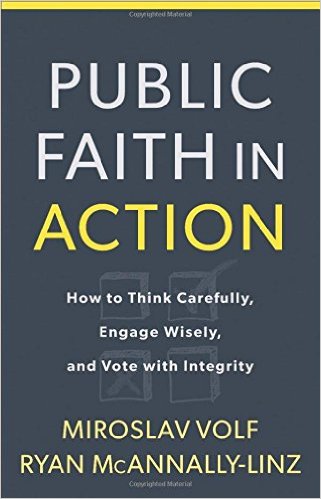
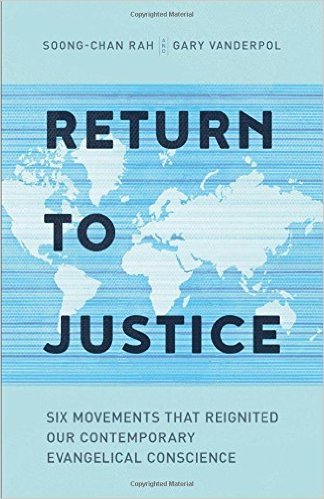 I hope you saw the last BookNotes piece – a ramble through some of my memories of the old (and unbiblical) dichotomy between social action and evangelism, or, more generally, about the importance of justice within the Christian faith, those who had affirmed that, and those who had not. Scot McKnight in The Kingdom Conspiracy (Brazos Press; $19.99) refers to these differing camps as today’s “pleated pants” crowd and the “skinny jeans” tribe; I’m not so sure such an assessment is fully accurate now, although such a clever description of two sorts of tendencies sure captures much about my own experiences decades ago, even if we all wore bell-bottoms. After hinting a bit at some of my own travels through various groups and movements, rejecting the prevalent split between those who cared about Christ but not much about the world and those who cared about the world but not Christ, I reported with gusto that in recent decades evangelicals have certainly taken up the full-orbed Kingdom call, becoming advocates for social change and the common good. In that sense, it was a very exciting post.
I hope you saw the last BookNotes piece – a ramble through some of my memories of the old (and unbiblical) dichotomy between social action and evangelism, or, more generally, about the importance of justice within the Christian faith, those who had affirmed that, and those who had not. Scot McKnight in The Kingdom Conspiracy (Brazos Press; $19.99) refers to these differing camps as today’s “pleated pants” crowd and the “skinny jeans” tribe; I’m not so sure such an assessment is fully accurate now, although such a clever description of two sorts of tendencies sure captures much about my own experiences decades ago, even if we all wore bell-bottoms. After hinting a bit at some of my own travels through various groups and movements, rejecting the prevalent split between those who cared about Christ but not much about the world and those who cared about the world but not Christ, I reported with gusto that in recent decades evangelicals have certainly taken up the full-orbed Kingdom call, becoming advocates for social change and the common good. In that sense, it was a very exciting post.
I said that these new books served also as good illustrations of the truth that evangelical publishers are leading the way with the best books about social issues and public justice. I thought it was a good post and the books worth reading.
If you don’t see yourself as evangelical, but you care about the social implications of the gospel, I am positive you will value these new books. Really — they are very good. If you are a theologically serious evangelical, you, too, will find these books compelling in many ways, I’m sure of it. Agree or not about the details of policy, the Biblical call to do justice and to work for the common good — loving mercy, doing justice, walking humbly with God who died to save His own good but ravaged world — is unavoidable, and those four or five books will help us all grapple with Biblical faithfulness in a needy world. They are on sale, and we hope you’d consider sending us an order; it really is something we are passionate about.
A few people, I might note, unsubscribed from receiving BookNotes after that one went out, although I suppose I don’t know why. In any event, if you want to deepen your awareness of ways to think about social justice and public advocacy, you should order a book or two from that list. I especially hope that younger evangelicals will stock up on this meaty stuff; it allows you to avoid the wasted time and energy that many of us lost decades ago as this shift was in the making. And if McKnight is right, that there is a new version of this old split still operative nowadays, it may be that these kinds of books will be just what we need. Praise the Lord that there are publishers and authors and bookstores helping guide young activists with good resources like these.
ENTER OS GUINNESS
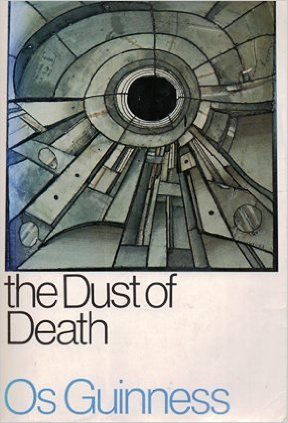 I have told the story before about reading in the mid-1970’s a (now out of print) early book by Os Guinness, The Dust of Death. It critiqued both the established technocratic culture of the West and also the East-facing, hippy counterculture of the left and then offered a “third way” of serving God in all of life with robust cultural engagement shaped by deeper Biblical truth. Hearing this stuff changed my life and in a way, my life’s trajectory.
I have told the story before about reading in the mid-1970’s a (now out of print) early book by Os Guinness, The Dust of Death. It critiqued both the established technocratic culture of the West and also the East-facing, hippy counterculture of the left and then offered a “third way” of serving God in all of life with robust cultural engagement shaped by deeper Biblical truth. Hearing this stuff changed my life and in a way, my life’s trajectory.
I discovered Francis and Edith Schaeffer (with whom Os had worked) and other rising evangelical intellectuals (from Richard Mouw to Calvin Seerveld to Ronald Sider to Bob Goudzewaard) and realized that there were thoughtful Christian books that informed and challenged and guided us towards thinking about our social moment and offered an astute analysis of the way of life needed to countered the ethos of the time. Os Guinness was indispensable in those years, and 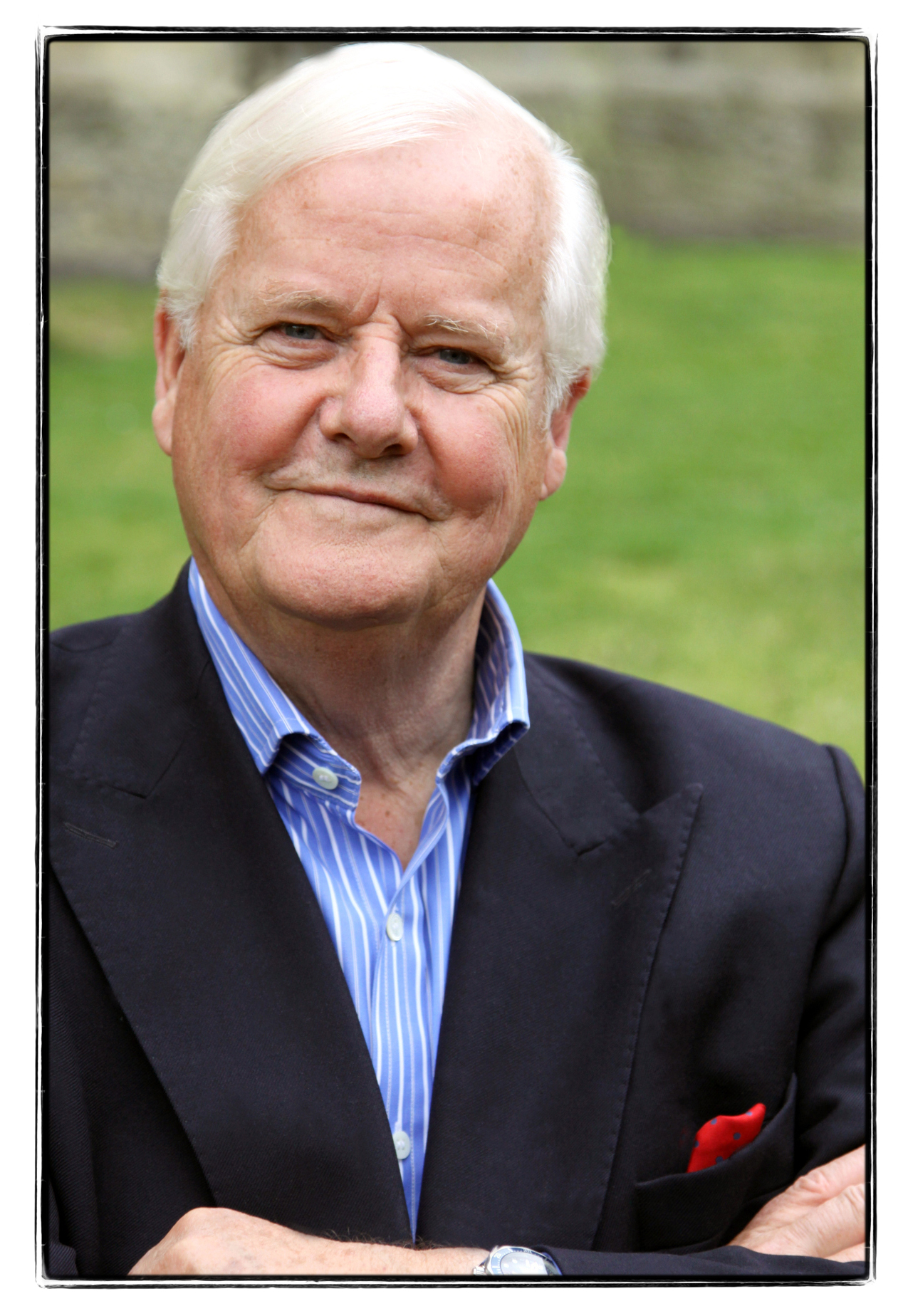 over the last four decades he has done seminal, stimulating, beautifully-written, challenging, books that combine Biblical faith and sociological analysis with glorious erudition that have created for him not only a huge following of fans (folks like me who would read any book he wrote on any topic) but also a major group of people who read him seriously, if critically, wanting to spend adequate time grappling with his mature observations. Agree or not, they know he is a major contributor to religious and cultural discourse in our day and know they should have read his work.
over the last four decades he has done seminal, stimulating, beautifully-written, challenging, books that combine Biblical faith and sociological analysis with glorious erudition that have created for him not only a huge following of fans (folks like me who would read any book he wrote on any topic) but also a major group of people who read him seriously, if critically, wanting to spend adequate time grappling with his mature observations. Agree or not, they know he is a major contributor to religious and cultural discourse in our day and know they should have read his work.
I say all this for at least two specific reasons.
Firstly, you should know that Os Guinness is one of the most important writers in my life, and one of the speakers and authors I consider to be a watershed leader; that is, he helped stem the tide of evangelical shallowness and goofiness, and helped catapult more than a handful of young scholars and pundits to integrate faith into all of life, to think Christianly, and to take up their callings in the world in serious ways.
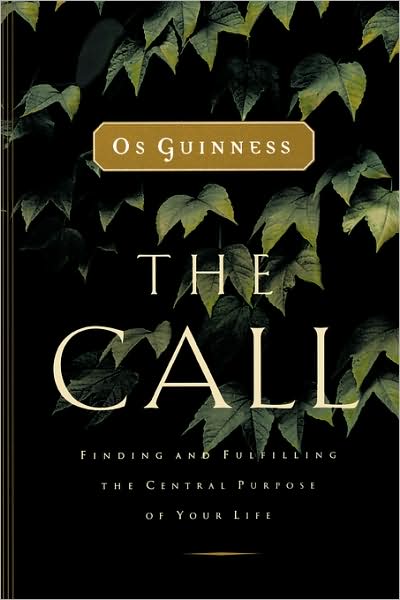 I still think his book The Call: Finding and Fulfilling the Central Purpose of Your Life (W Publishing Group; $17.99)
I still think his book The Call: Finding and Fulfilling the Central Purpose of Your Life (W Publishing Group; $17.99)
is a must, must-read! In all of his books he has made me think, driven me to ponder and to prayer, and is an important figure for our work here.
Secondly, besides his influence as thought leader and long-distance mentor to many of my best friends, Guinness is respected throughout the world as a speaker and teacher, having been led by God into conversations with significant organizations in Western Europe, in China, and within the think-tank world of Washington DC. Sometimes, when he tells a story of speaking at a banquet with communist leaders in his beloved China (he was born there) or at a strategic think tank in Geneva or Brussels or Oxford or Stanford, I am deeply moved, that God in His providence has allowed for Guinness to be in world-class conversations about the unfolding 21st century with some of the most impressive people in the world. You see, it isn’t just a handful of friends here that have discovered the importance of his books; he is internationally known and very widely respected.
I have highlighted many of Guinness’s other books before – here is a good overview.
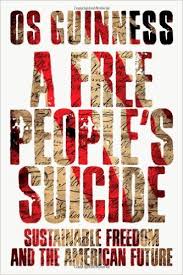
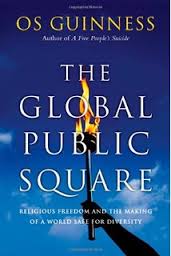 In just the last few years Os did two books on religious freedom – one, A Free People’s Suicide: Sustainable Freedom and the American Future (IVP; $17.00) reminding us of the importance of working on first amendment protections of freedom for and from religion in the United States and another on the urgent (if gargantuan) task of creating space for religious freedoms globally entitled The Global Public Square: Religious Freedom and the Making of a World Safe for Diversity. (IVP; $17.00.) Both are very interesting and recommended. To understand his broader, structural plan for this kind of civility in US culture, offering evaluations of various “schools of thought” or models of working out the structures of a pluralistic society, see his under-appreciated The Case for Civility: And Why Our Future Depends on It (published by HarperOne; $23.99.)
In just the last few years Os did two books on religious freedom – one, A Free People’s Suicide: Sustainable Freedom and the American Future (IVP; $17.00) reminding us of the importance of working on first amendment protections of freedom for and from religion in the United States and another on the urgent (if gargantuan) task of creating space for religious freedoms globally entitled The Global Public Square: Religious Freedom and the Making of a World Safe for Diversity. (IVP; $17.00.) Both are very interesting and recommended. To understand his broader, structural plan for this kind of civility in US culture, offering evaluations of various “schools of thought” or models of working out the structures of a pluralistic society, see his under-appreciated The Case for Civility: And Why Our Future Depends on It (published by HarperOne; $23.99.)
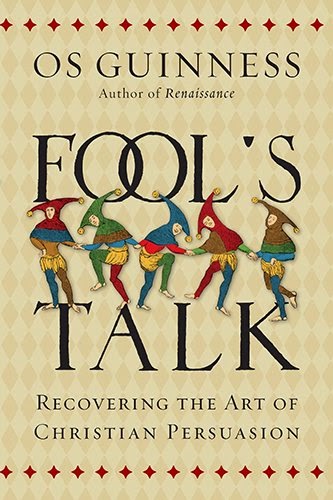 Last year Mr. Guinness released an award-winning hardback on the lost art of civil persuasion called Fools Talk: Recovering the Art of Christian Persuasion (IVP; $22.00) which we are very keen on. (Here is my long review of it.) Perhaps you can see the flow and connections of these books, a bit: Os is passionately committed to the principles and structures that allow for religious freedom for all (including those who practice no religion: it’s freedom for and freedom from as well.)
Last year Mr. Guinness released an award-winning hardback on the lost art of civil persuasion called Fools Talk: Recovering the Art of Christian Persuasion (IVP; $22.00) which we are very keen on. (Here is my long review of it.) Perhaps you can see the flow and connections of these books, a bit: Os is passionately committed to the principles and structures that allow for religious freedom for all (including those who practice no religion: it’s freedom for and freedom from as well.)
But as an evangelical, he knows the importance of sharing the good news in a manner which is honest and free of coercion, so he both argues for religious diversity and toleration and he invites us to then learn how to more persuasively talk with each other about the first principles of the faith. He doesn’t want to be pushy or coerce but can’t settle with a “live and let live” approach, either, as if our differences don’t make a difference, or as if the message of salvation in Christ wasn’t of ultimate concern. If we truly believe something to be right and true we should want to share and persuade others about it. We fight for the freedom for all to believe as they must, but he also wants to learn to speak effectively with and to any and all and whosoever will.
Guinness has, perhaps more than anyone I have ever known, interacted with some of the world’s leading philosophers (Bertrand Russell, A.J. Ayers!) and statesmen from several continents. He has talked with leaders in the US Congress and he has worked for the BBC and the Brookings Institution. From Marxist activists to the biggest captains of industry to ordinary folks who show up at his lectures, he has learned to speak deeply with women and men of substance, all who, like all sons of Adam and daughters of Eve, have hurts in their hearts and search for significance, meaning, joy. He embodies well his mentor Francis Schaeffer’s insistence on “honest answers for honest questions.”
Fool’s Talk: Recovering the Art of Christian Persuasion is a book like no other as it takes seriously not only evangelical expectations of sharing faith unashamedly but also studies well the culture in which seekers find themselves. It is a must-read for anyone who realizes the limits of preaching at people or merely asserting Christian truth claims (let alone bullying or unpleasant debating) but who wants to communicate with wit and passion in order to persuade others to think deeply and consider the truths of the Christian message. Again, within the large shelf of books about evangelism or apologetics or communication, it is a rare, brilliant contribution.
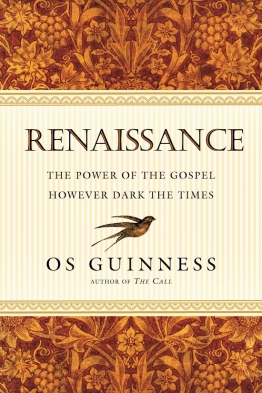 In the middle of these books about the dangers of our times and the desire to speak wisely into the quandaries of our age, Guinness wrote a powerful book called Renaissance: The Power of the Gospel However Dark the Times (published by IVP; $16.00.) It was a grand little book, eloquent and passionate and true. Os’s classic theology and deep spirituality came to the fore in that handsome book as he soberly assessed the complex and seeming insurmountable drift in our age towards secularization and social fragmentation. With the church too often mired in cultural accommodation or trendy programs to remain viable, things could indeed look bleak. In Renaissance Guinness reminded us – almost in contrast to books like To Change the World or the other popular “cultural engagement” literature and social transformation blogs and think tanks and conferences – that if social change is to take root, it will be because we have cried out to God and Christ is honored through the historic way: churches proclaim Christ as Lord, we wait on the Spirit to work, and we serve with sacrificial commitment to love God and neighbor as we seek renewal and revival.
In the middle of these books about the dangers of our times and the desire to speak wisely into the quandaries of our age, Guinness wrote a powerful book called Renaissance: The Power of the Gospel However Dark the Times (published by IVP; $16.00.) It was a grand little book, eloquent and passionate and true. Os’s classic theology and deep spirituality came to the fore in that handsome book as he soberly assessed the complex and seeming insurmountable drift in our age towards secularization and social fragmentation. With the church too often mired in cultural accommodation or trendy programs to remain viable, things could indeed look bleak. In Renaissance Guinness reminded us – almost in contrast to books like To Change the World or the other popular “cultural engagement” literature and social transformation blogs and think tanks and conferences – that if social change is to take root, it will be because we have cried out to God and Christ is honored through the historic way: churches proclaim Christ as Lord, we wait on the Spirit to work, and we serve with sacrificial commitment to love God and neighbor as we seek renewal and revival.
This approach is absolutely not a step back from his life-time work of intellectual engagement and cultural analysis, but it did shift our attention to the essential truths of Biblical faith: we pick up our crosses and serve the best we can, and let the results to God. Spiritual and congregational revitalization, social change, cultural renewal, all are gifts from the Sovereign King of the Universe which cannot be fabricated. Renaissance was sobering yet hopeful as he told stories from throughout history of how the gospel itself can transform lives and cultures and societies.
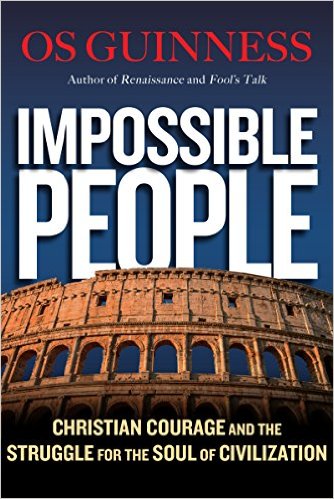 Guinness’ brand new release, Impossible People: Christian Courage and the Struggle for the Soul of Civilization (IVP; $20.00) is a hefty sequel to Renaissance, extraordinary, and vital. The last chapter of Renaissance was called “Our Golden Age Is Ahead” and it was a beautiful illustration of Christian hope. Impossible People, however, will sober us to appreciate what it may take for us to realize that dream of God’s whole-life renaissance breaking into history in our time. Courage and struggle, indeed.
Guinness’ brand new release, Impossible People: Christian Courage and the Struggle for the Soul of Civilization (IVP; $20.00) is a hefty sequel to Renaissance, extraordinary, and vital. The last chapter of Renaissance was called “Our Golden Age Is Ahead” and it was a beautiful illustration of Christian hope. Impossible People, however, will sober us to appreciate what it may take for us to realize that dream of God’s whole-life renaissance breaking into history in our time. Courage and struggle, indeed.
Although it is a stunning survey of the contours of the culture of the late modern world, the fundamental point so concisely and powerfully explored in Impossible People is that those who are called by God – the church of Jesus Christ, regardless of denomination or theological bias – are to be faithful, no matter what the cost, and that the hope of any cultural renewal in this era of increasing change and choice and secularization and biotechnology and so forth resides most in the ability of Christians to stand apart of the crowd, discern what fidelity looks like, and live in ways that are true to the authority of Christ. He talks about needing to speak a clear “no” and a hopeful “yes.” It is no cliche for him (as the fate of civilizations lie in the balance) but he insists we must be more intense in our study and more courageous to live out being “in but not of” the world, not in the abstract, but in little, practical, daily ways, even. I have rarely read a book with such urgency, insisting that the erosion of Biblically-sane views and ways of living (whether from graying mainline liberals or hip, emergent faith communities, or grand evangelical mega-churches) must be reversed. In his view there is way to much cultural accommodation, to much re-configuring classic faith tenets, and way too much sloppy, theological fuzziness. Although I may differ or want to clarify where I see such problems and how serious the consequences of each are, nuancing the critique in different ways, I must say I most basically agree with his passion and concern.
As Guinness says repeatedly, there is a price to be paid for those who assert Biblical authority in any age, but it is particularly complex and demanding in an age renowned for creating a “crisis of authority” where nobody gets to assert anything as truly true, since nobody has authority (and there is no true truth to speak, anyway.) Christians in the past (think of the early church in the age of the brutalities of the Roman Empire) have through God’s grace risen to the occasion to both consider deeply the forces of the culture aligned against them and the ways in which Biblical faithfulness would drive them to resist and reform. They paid a price. Can we do it again?
Are we like Benedictine reformer Peter Damian (c 1007 – 1073) that Dante had in the highest circle of paradise? He was called an impossible man. St. Peter Damian was “criticized in his time for being fanatical and negative but in fact he was “passionate about the church’s ‘welfare of souls’ and about faithfulness to Jesus and the truth of the gospel.” Guinness continues,
Yet it was these positive passions that made him sever and unsparing in his denunciation of all forms of corruption and immorality, and in attacking them he could not be swayed by either obstacles or opposition.
Ever the master of the pithy quote and always informed by great thinkers of the past, reading this book will be a treat for anyone who loves to learn and who likes an informed overview of some of the greatest issues faced by some of the greatest writers ever – on this journey he quotes Hildegarde of Bingen and Karl Marx and Henry Kissinger and Nicholas Berdyaev and Rabbi Jonathan Sacks and of course the likes of T.S. Eliot, G.K. Chesterton, C.S. Lewis, and so many more. Anyone who loves good books — I mean really good books — will treasure this.
Guinness knows his Nietzsche and cites him more often and with more insight than any other Christian author I know. One need not be a philosopher, though, to appreciate the profundity of his wrestling with the spirit of the great prophet and nihilist. To say Guinness is widely read is an understatement, and to say that he is a joy to learn from – whether you fully agree with his assessments or his conclusions — is nearly to state the obvious. Just over 200 pages, this new hardcover is not daunting, although it is serious. With his many points and sub-points it may seem nearly Byzantine, but with some close attention, it becomes clear that it is arranged with the expertise of a master craftsman. You will not get bogged down as you might by a 500 page tome of detailed scholarship, although underlining and bullet pointing while reading will reward readers with greater comprehension. It will take some commitment to read it carefully, perhaps to journal while studying. It is well worth it.
I would never want to trivialize Guinness’ work but I might say, sort of playfully, that this is almost a greatest hits album, with some new tracks and bonus material. Much of this he has said before – in chapters here, in talks there, in other books, even. (I never tire of his telling how a dear foreign missionary misunderstood an entire talk he gave at Lausanne in the Philippines because she misheard his critique of modernity, thinking he was talking about maternity. I never tire of his reports of communist leaders asking him off the record about the viability of the Christian worldview to sustain new ideas in their post-Mao era. And I always value hearing a new Winston Churchill quote – has he ever done a book without a fun story of the colorful Churchill? I laughed right out loud learning about his proclivity to nap and his advice to sit, or better, lie down, whenever possible.)
Even if you’ve read nearly every Guinness book and essay and heard him lecture, you will learn much new as he outlines the forces of modernity (not maternity) and highlights chief threats, key consequences, top obstacles and the like. It is simply amazing stuff.
Some of the ideas and descriptions in Impossible People: Christian Courage and the Struggle… have appeared in early essays and books, which does not imply it is re-treading old stuff, but that it is the maturing of his thought and an indication of his continued passion. He’s not giving up or moving on, but still saying things that really matter. He has brought up some of this in brief books like Time for Truth and Unriddling the Times or the ever-relevant Dining with the Devil: The Megachurch Movement Flirts with Modernity. (Order it from us today!) His Screwtape-like spy novel – first called The Gravedigger File, now expanded and re-titled The Last Christian On Earth — was an early creative attempt to popularize the significant cultural critique found in the pages of Peter Berger, and I highly recommend it. Beth and I have heard Os offer brilliant and eloquent lectures on these themes, noting how both “the history of ideas” and “the sociology of knowledge” combine to help us understand our times and live faithfully “in but not of” the world of late modern capitalism and what some call hyper-modernity.
And this is the theme of the new book – what are we to think and do in an age when there are forces causing the West to cut itself off from its obvious Christian roots, leading us (dangerously) into what he calls a “cut flower civilization.” That is, we still live with a general sense of goodness and beauty and ordered liberty and law and meaning and a desire for justice and a reason to fight evil, but the philosophical basis for that is no longer valued, and will soon no longer exist. How long can the (still lovely) cut flowers live and offer goodness and beauty once they are torn from the soil and their roots cut off? As he put it once before, we are living off of a shadow of the real thing, perhaps soon a shadow of a shadow. Time is running out.
Although threats to cut ourselves off from our religio-cultural roots come from radical Islam and from progressive secularists, the biggest threat of all is more important, in part because it is less understood and more easily ignored.
As Guinness puts it in the very first paragraph of Impossible People, he worries that we have (mostly unknowingly) caved to the new dark ages that are fast coming and our shameless laxity and compromise has grave consequences. He writes,
… whether through the general seductions and distortions of advanced modernity, the tempting thinking behind the sexual revolution, or a failure to understand the significance of the hour and appreciate the implacable hostility of some of the forces against us – and so blunting our witness and betraying the lordship of and authority of Jesus.
Os is a careful and caring person, an astute observer, a man who likes a good joke and a good glass of wine; he is neither fanatical or impossible, in the negative sense. I do not think he is a Jeremiah, although, in this book – it’s been building in recent years, I think – he is sometimes shrill. I take it that his urgency comes from his reading of the times, his frustrations with how few seem to care about the condition of the world, or how many seem to care but are unable or unwilling to think through the implications of living as truthful, principled people.
We are not very well-schooled in deep cultural criticism, it seems, so it must be frustrating for him (as it is for us here at the shop, I’ll admit) to find those who refuse to take seriously the philosophical and cultural impact on our very way of seeing, imagining, construing and living in the world, not taking seriously the increasingly pluralizing world where nothing is true, or (as Marx put it) “everything that is solid melts into air.” Sure, some Christians rise up to protest this or that affront to faith, we are riled by that hot button issue or this social concern, right or left, depending. We are concerned about pornography or post rebuttles on Facebook against those who mock Christians. Why haven’t Christians (and especially evangelicals who claim such passion for “winning the world for Christ” and standing for piety and holiness) been more intentional about discerning the deeper and more corrosive ways that modernity has influenced us? How have social and ideological trends left us with a “yawning vacuum, hollowed out…”
What does Os mean by this?
 Just think of how we’ve absolutized “choice” in our hyper-consumeristic world — literally assumed now in nearly every area of life, embedded in our social imagination by the habit of having so many cereals and soaps and TV channels to choose from — and how that subtly shapes our understanding of “church shopping” or even conversion and spiritual formation, as if theology is just a whim to be selected based on personal preference. Just think of how advertising and branding has over-inflated truth claims, and how that erodes trust and builds cynicism – even as our church growth plans and ghost writing and cheesy Christian sub-culture have too often played into that very superficial and finally untruthful way of talking about things. We wonder why people are cynical about institutions when they are tutored in that habit of heart by the anti-hero stories they absorb on Netflex — made more consumable and influential, in fact, now that people watch Netflix on their pocket phones. With our 24/7 news cycles we learn about the troubles of the world all the time; how can we not be jaded? Or even think of how our proper Christian worldview thinking (and the multi-cultural schooling from the culture at large) has properly led us to appreciate the “social construction of reality” and how we must work hard to understand the perspectives of others but how that same insight can be taken too far to bolster a view that there is no truth whatsoever and that everything – from what constitutes a family to what constitutes a church to what constitutes a just government or a true religion – is just up for grabs. Or not even up for grabs, in this “whatever” world. Could it be, too, that our daily experience of the speed of our computers or our on-line shopping habits using cell phones and our mediated experiences of choice and change have helped us experience life — “see” and “know” what we think we see and know — in this new way almost subconsciously? It is sort of obvious that our souls are in trouble more these days, say, lacking the virtue of patience, since we are used to high-speed internet and “do” waiting differently than anyone before us in all of history; that is, our very understanding and experience of time is mediated by our habits with gadgets so we don’t have a clue about what is going on in so many Bible texts that call us to wait. As James K.A. Smith has said in his extraordinary You Are What You Love, we must learn to ask what tools we use do to us.
Just think of how we’ve absolutized “choice” in our hyper-consumeristic world — literally assumed now in nearly every area of life, embedded in our social imagination by the habit of having so many cereals and soaps and TV channels to choose from — and how that subtly shapes our understanding of “church shopping” or even conversion and spiritual formation, as if theology is just a whim to be selected based on personal preference. Just think of how advertising and branding has over-inflated truth claims, and how that erodes trust and builds cynicism – even as our church growth plans and ghost writing and cheesy Christian sub-culture have too often played into that very superficial and finally untruthful way of talking about things. We wonder why people are cynical about institutions when they are tutored in that habit of heart by the anti-hero stories they absorb on Netflex — made more consumable and influential, in fact, now that people watch Netflix on their pocket phones. With our 24/7 news cycles we learn about the troubles of the world all the time; how can we not be jaded? Or even think of how our proper Christian worldview thinking (and the multi-cultural schooling from the culture at large) has properly led us to appreciate the “social construction of reality” and how we must work hard to understand the perspectives of others but how that same insight can be taken too far to bolster a view that there is no truth whatsoever and that everything – from what constitutes a family to what constitutes a church to what constitutes a just government or a true religion – is just up for grabs. Or not even up for grabs, in this “whatever” world. Could it be, too, that our daily experience of the speed of our computers or our on-line shopping habits using cell phones and our mediated experiences of choice and change have helped us experience life — “see” and “know” what we think we see and know — in this new way almost subconsciously? It is sort of obvious that our souls are in trouble more these days, say, lacking the virtue of patience, since we are used to high-speed internet and “do” waiting differently than anyone before us in all of history; that is, our very understanding and experience of time is mediated by our habits with gadgets so we don’t have a clue about what is going on in so many Bible texts that call us to wait. As James K.A. Smith has said in his extraordinary You Are What You Love, we must learn to ask what tools we use do to us.
This is not new ground for Os but this is an excellent and deepening and passionate study of it all, explaining how we got into our accommodating coziness with the forces of modernity. He helps us be critical about our own patterns and concerns — have we been distracted by fighting smaller battles, failing to look at the deepest and most root causes of our cultural malaise, our deforming ideologies and idols and how they have influenced us unawares? Might we deserve the rebuke Jesus gave to the Pharisees who “strained out the gnat but swallowed the camel?” Do we even know what that means?
One fascinating case study of this may be how some of us have insisted on doing intellectual battle with the new atheists, publishing books of apologetics, rebuttal, setting up debates and such. Guinness clearly does not oppose that, but he is brilliant in his chapter on atheism – some of it will be of interest to those who read him more fully on this in Fool’s Talk – but he is very quick to explain that modernism as a set of ideas (given full voice by the loudly hostile new atheists) is not the same as the subtle influence of cultural ethos modernity, which may be more damaging in the long run. One is a set of ideas, which must be debated and countered, but the other is more subtle and more comprehensive, sucking us all into a post-Christian zeitgeist and practices and pattern of cultural assumptions. In this regard, it could be that debating atheism with the few loud critics of faith is not the primary or most foundational matter at hand. Maybe literally (re)thinking through the role of computers in our lives, say, or how we approach time or speed or sex or food or money or suffering or work might be more fruitful for lasting cultural reformation.
In a powerful illustration, he compares the legendary example the Dutch boy with his finger in the dike, stopping the leak, and a more devastating and difficult task to stop the force of a mudslide. With a mudslide, there is no silver bullet, nothing one person can do alone, no easy answer, and thinking otherwise is itself a capitulation to the forces of expertise and bureaucracy and power. Modernity itself actually teaches us to think like that – find the fast fix, the technical solution – and our secular age in late modernity has so captured our imaginations that we even think of reformation and revival in terms like this with quick, easy, church growth plans, or political advocacy, as if a new program or outreach or website or policy could stop the mudslide.
JAMES K.A. SMITH and CHARLES TAYLOR?
In this study of the intellectual and material and cultural influences of the modern era, Impossible People would be a very good read alongside James K.A. Smith’s essential overview of the dense The Secular Age by Charles Taylor. (I have told some who are not terribly familiar with this kind of serious 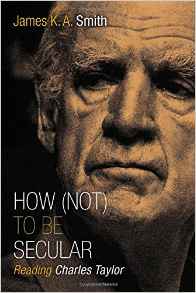 philosophical work that if Smith’s intro to reading Charles Taylor — called How (Not) To Be Secular: Reading Charles Taylor (Eerdmans; $16.00) — is a bit much, there is one brilliant chapter which summarizes Taylor in Tim Keller’s small book called Preaching: Communicating Faith in an Age of Skepticism (Viking; $19.95) insisting as he does that familiarity with Taylor is crucial for relevant teaching and preaching a proclamation to those living at the heart of our modern age.) At any rate, Taylor’s thesis about the seemingly disenchanted era in which we live – the quandary of finding meaning and purpose within the still-God-haunted post Christian secular age – runs in some ways parallel to Guinness’s, and reading Guinness (while serious and sophisticated) will be an easier and more engaging experience for many than Taylor or even Smith.
philosophical work that if Smith’s intro to reading Charles Taylor — called How (Not) To Be Secular: Reading Charles Taylor (Eerdmans; $16.00) — is a bit much, there is one brilliant chapter which summarizes Taylor in Tim Keller’s small book called Preaching: Communicating Faith in an Age of Skepticism (Viking; $19.95) insisting as he does that familiarity with Taylor is crucial for relevant teaching and preaching a proclamation to those living at the heart of our modern age.) At any rate, Taylor’s thesis about the seemingly disenchanted era in which we live – the quandary of finding meaning and purpose within the still-God-haunted post Christian secular age – runs in some ways parallel to Guinness’s, and reading Guinness (while serious and sophisticated) will be an easier and more engaging experience for many than Taylor or even Smith.
If you’ve read either of those and are familiar with Taylor you will surely want to pick up Impossible People. If you have not, this is a great way into that broad conversation about our secular age, what it is and isn’t, and what we might do about it. Not only does Guinness go out of his way to explain what he means by words like pluralizing or routinization or postmodernism or globalization, he offers overt Bible teaching, a closing prayer after each chapter, and reflection questions along the way, making it less arcane and more obviously helpful for most Christian readers. If you have read this sort of stuff, I think you will value Guinness and learn more, or learn to think more knowingly about what it means to be more deeply Christian in this world. Again, even if you have only heard of those books – Charles Taylor or Jamie Smith or Tim Keller’s adaption – this new one by Guinness might be a great start, even though he curiously doesn’t site Taylor or Smith at all.
Just to be clear, allow me this long quote:
Let me be clear. If modernity is a deadly challenge to the church, it is not a frontal challenge in the way the hostile ideologies are. The new atheists, for example, are like the communists earlier. They are implacably opposed to the Christian faith and make no bones about their opposition to the Christian faith and their exclusion of Christians. (In the much-quoted words of the Harvard geneticist Richard Lewontin, “we cannot allow a Divine foot in the door.”) “No faith wanted here” they say in effect, separating out people of faith as Nazi guards did certain Jews on their arrival at Auschwizt-Birkenau.
That crude, open kind of opposition is certainly the sort of challenge posed by certain modernists such as the new atheists, but it is not the challenge of modernity. After all, there is a vital difference between secularism (as a personal philosophy), seperationism (as a legal and political policy advocating strict religion and public life) and secularization (as a process that is part and parcel of modernization. These three terms are commonly confused and while they overlap in having the same end result, they are entirely different ways to getting there, and the differences are crucial. The first is a philosophy, the second a political philosophy and the third is a process.
Guinness continues, importantly,
Modernism as a philosophy may oppose faith outright but modernity does not. Its damage is not through opposition but through seduction and distortion. It doesn’t say, for example, “No faith allowed here” but “No faith is needed here.” Contrary to Jesus and the Torah, modernity claims that man can now live “by bread alone,” or rather by science, technology, management, and marketing alone. Secularists do not want God, whereas the secularized have no need of God, and that is only one of the many seductions and distortions of modernity.
After these kinds of astute explanations of terms and illustrations of how our secularizing age has eroded the influence of the Christian faith in the West – and will, increasingly, in the modernizing world, which, he predicts, could follow Europe and the US in leaving behind the principles and truths and values derived from a Jewish and Christian past – Os tells clarifying stories and offers prayers and Biblical reflection to put into focus the task at hand. In this, it is quintessential Os, incisive social and cultural critique and inspiring Biblical preacher. His take on Scriptural stories – contrasting the “Samuel moment” and the “Moses moment” in the powerful Epilogue – are themselves worth the price of the book.
I mentioned that Dr. Guinness has spoken and written widely about these forces and trends and influences and challenges – each listed nicely, outlined, explained in orderly fashion – for most of his career. Indeed, this brings his prophetic “no” and his plea for a classic, theological “yes” to the fore in a way that is nearly a capstone.
But I also said that besides being a greatest hits review, there are new insights (fresh as this year’s news, vital as ever) and some brand new material.
GENERATIONS
Guinness has raised this before at least in passing more than once, but he has a great section looking at the role of generations in the Bible and how that might inform our too-casual acceptance of “generational” thinking. Are all born in the baby boom really all alike? Besides the obvious fact that millennials have all been raised post 9-11 and with digital gizmos, are they, as a generation, easily generalized? Os thinks this is sociologically sloppy and on most days, I agree with him. It’s in a chapter well worth pondering as a larger piece of his case of how we’ve bought into the current ethos uncritically, absorbing language which shapes understandings and drives us to practices (even in the church, with Gen X congregations or tween worship services and the like.) Os is brilliant at exposing the history of philosophical ideas and showing the social forces that have aligned to cause certain sociological shifts, and then pokes at our easy Christian accommodation to these popularly accepted trends. Again, he doesn’t cite Charles Taylor’s previous work on “social imaginaries” but he could have. And his study of “generational” stereotypes is important in it’s own right, but also another great case study of our cultural captivity.
There is one topic I’ve not heard him speak about before and it is very important to him in this book. Readers will have to judge if he is right, but it is an exceptionally vital contribution, if he is correct.
WALTER WINK and the PRINCIPALITIES AND POWERS
He has two chapters in Impossible People on what is sometimes called spiritual warfare. If we are to be Biblical people, fully using Scripture as our framing narrative and guide to thinking about all life and times then we cannot allow our embarrassment of how some within the church have trivialized or been oddly spooky about demons and evil spirits to cause us to ignore the possibility that there are, indeed, spiritual forces and demonic influences. In this he draws significantly – although with valuable criticism, I think – of the late Walter Wink. I only know of one other book that takes his study of principalities and powers seriously, and that is Marva Dawn’s remarkable, appreciative, but critical engagement with Wink (in her Powers, Weakness, and the Tabernacling of God) Guinness notices certain Biblical stories and teachings and cites Oxford-trained theologians of this topic such as Derek Prince.
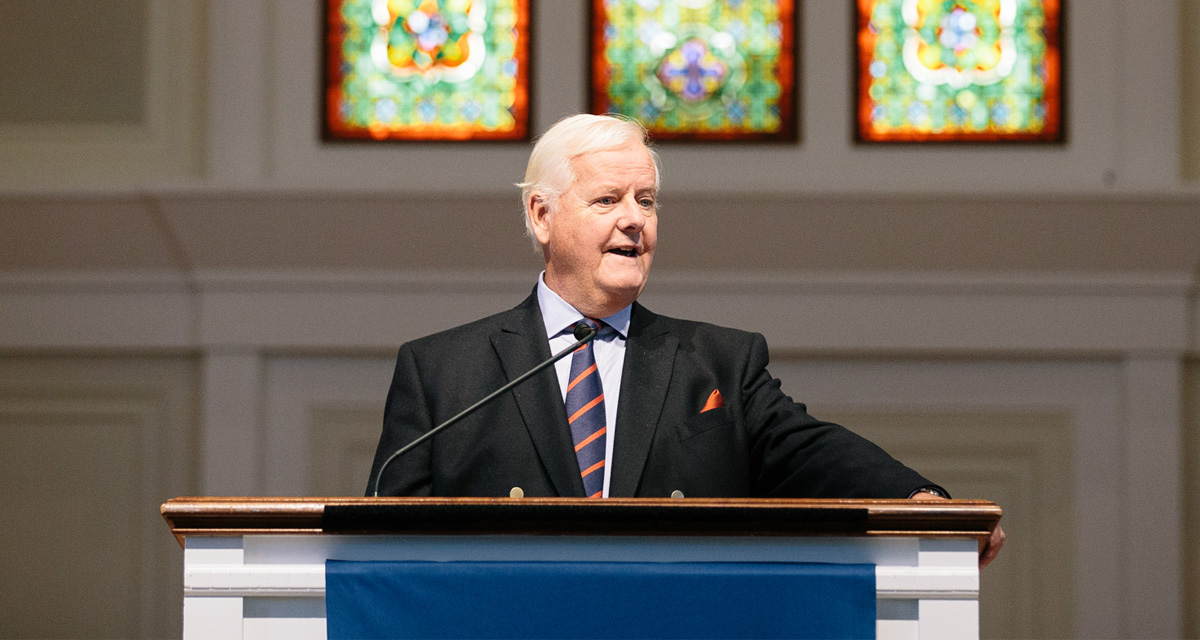 His study of “three tools” to discern and engage the advanced modern world, include a wise exploration of the weapons of spiritual warfare. His rumination on assumptions about power, prayer, humility, doing God’s work in Christ’s own ways (he is not a pacifist, I am sure, but takes seriously the call to love even enemies and be gracious to all by following the way of the cross) are rich. In a way, this part especially feels like a companion to Renaissance, reminding us that even in our cultural analysis and discernment about the pressures and seductions of modernity as a way of being in the world, we must always be prayerful and spiritually-aware. (In fact, our assumption that there aren’t demons and powers is itself an indication of our odd modern ways — what other culture in the history of the world is so ignorant, indeed prides itself in its ignorance, about the invisible and mysterious aspects of reality?)
His study of “three tools” to discern and engage the advanced modern world, include a wise exploration of the weapons of spiritual warfare. His rumination on assumptions about power, prayer, humility, doing God’s work in Christ’s own ways (he is not a pacifist, I am sure, but takes seriously the call to love even enemies and be gracious to all by following the way of the cross) are rich. In a way, this part especially feels like a companion to Renaissance, reminding us that even in our cultural analysis and discernment about the pressures and seductions of modernity as a way of being in the world, we must always be prayerful and spiritually-aware. (In fact, our assumption that there aren’t demons and powers is itself an indication of our odd modern ways — what other culture in the history of the world is so ignorant, indeed prides itself in its ignorance, about the invisible and mysterious aspects of reality?)
Is Guinness correct to hint that there are demonic forces behind the intractable influence of modernity? Is he correct in suggesting that evils like the horrors of Hiroshima are indications of demonic idols in the land? Do the current culture wars and their painfully nasty spirit indicate some ugly evil spirits in high places that are doing their dark work? He is not too explicit and he is not sanguine about this; his line of thought, though, is genuine and generative. What do you make of it? It could be a fruitful conversation to have. Or are we too locked into what Max Weber called our “iron cage” and what the Bible refers to as “brass heavens.”
Another thing that must be mentioned: Os is relentless – as he always has been — about the dangerous of revisionist views of the Bible, inadequate views of the core teachings as presented in the creeds and councils of the historic church. In Impossible People… he is more bluntly outspoken than ever, or so it seems to me. In this regard he is resolute in offering rebuke. (Could it be that his own experience of seeing doctrinal laxity and corruption in his local denominational judicatory has been influential? It surely is more than that, and he has long been critical of fuzzy emergent or post-evangelical leaders who seem to abandon conventional theology and views of truth, not to mention his regular admonishment of sloppy liberalism within mainline Protestant traditions.)
Still, I am less sure that most mainline churches are so theologically bankrupt and that there is not still much value in a “big tent” approach to the broader church, liberal, mainline, evangelical , fundamentalist, Pentecostal, Catholic and Orthodox, global and local than this book seems to accept. Os seems to believe that the mainline Protestant churches have decisively reneged on historic orthodoxy and that those committed to greater marriage rights for GLTB folks are necessarily shallow and scandalous in their disconnection from historic Biblical views. I am less sure of that, and wished he has been more characteristically generous with his non-evangelical and revisionist brothers and sisters, some of whom would not see themselves as unfaithful as Os implies. This may not be the place to explore how blunt and confident one needs to be in denouncing the extremes of Biblical infidelity, and how best to more civilly describe and engage the motivations and intentions of those with whom we disagree, but I will note that I was disappointed by the tone of a few paragraphs here. It is understandable, and certainly is a cri de coeur, but anguishing to read nonetheless. I sincerely hope that those with whom he takes exception in this call to be unstoppably faithful, uncompromising people, will not disregard his call to truth and fidelity in these complicated times, even though he is simplistic in his assessment of their positions.
And so, like any book written by anyone, most readers should be careful to think critically, even as we are open to the insight of the author. I suspect you will be offended by something in this book, and you will be deeply glad for much. You will scratch your head and perhaps commit to really think things through a bit more on your own, teasing out the implications for your family and community and church. You will learn much about history, philosophy, culture, sociology and the state of our current world from Guinness. Life-long learners simply must have it, and will be grateful for the vast amount of information, profoundly framed and urgently expressed.
But you will also be challenged, exhorted to be the sort of person who pleases God among all else — to live before Guinness’s famously put “Audience of One.” Will Christ someday say “found faithful”? This phrase means very much to Os, and it was a tender revelation to hear of it, not maudlin, but nonetheless exceptionally moving. I will let you read it yourself and discover it’s meaning for him, but it is remarkable. May we all have such gumption and devotion, perhaps learned during times of great difficulty, perhaps learned through cultural analysis like the bulk of this book, or directly from the relentless teaching of the Old and New Testaments. I am sure this book will help. It is important. As Guinness reminds us, after a moving meditation on the “show me your glory” theme, and how it must be our own urgent prayer,
“Only those who know God in unmistakable reality can stand the test of the reality of the world in our day.”
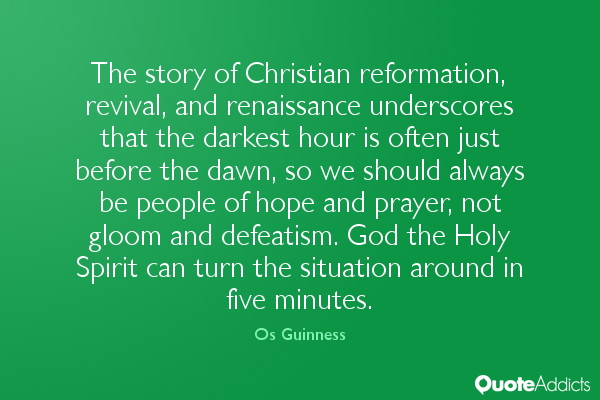
OTHER RECENT BOOKS & RESOURCES
 I read and write with a view of telling others about books they might enjoy, from which they would benefit. I, with Guinness, am deeply interested in the texture of Christian fidelity in this compromising age of change and choice and relativism. So I think of other ways to connect the dots, other resources, other ways into the deepest conversations that matter the most. Impossible People: Christian Courage and the Struggle for the Soul of Civilization is surely one of the most important books of the year, one of the most anticipated books of the summer. I hope you order it at our discounted price, using the secure link below.
I read and write with a view of telling others about books they might enjoy, from which they would benefit. I, with Guinness, am deeply interested in the texture of Christian fidelity in this compromising age of change and choice and relativism. So I think of other ways to connect the dots, other resources, other ways into the deepest conversations that matter the most. Impossible People: Christian Courage and the Struggle for the Soul of Civilization is surely one of the most important books of the year, one of the most anticipated books of the summer. I hope you order it at our discounted price, using the secure link below.
But, also, think of these, all 10% off the shown price:
 Renaissance: The Power of the Gospel However Dark the Times Os Guinness (IVP) $16.00 I described this book above; it is hopeful and inspiring volume which is a prelude to the new Impossible People. Read it before or after, but read it, please. A wonder, a true gift. Listen to what Becky Pippert says:
Renaissance: The Power of the Gospel However Dark the Times Os Guinness (IVP) $16.00 I described this book above; it is hopeful and inspiring volume which is a prelude to the new Impossible People. Read it before or after, but read it, please. A wonder, a true gift. Listen to what Becky Pippert says:
“This is a profound, realistic and hopeful book that reminds us that
even in the darkest times the power of the gospel can change the world….Guinness
calls for renewal: in our confidence in God, in the power of the gospel
and in the great truths of Scripture, even as we engage with the world
around us. No other writer I know offers such a rich background of
astute cultural analysis combined with a deep understanding of history. I
finished this book feeling a deep sense of hope, which was fortified by
his powerful prayers at the end of each chapter. If we heed the wisdom
in this marvelous book, we could well become effective agents for Christ
for such a time as this.”
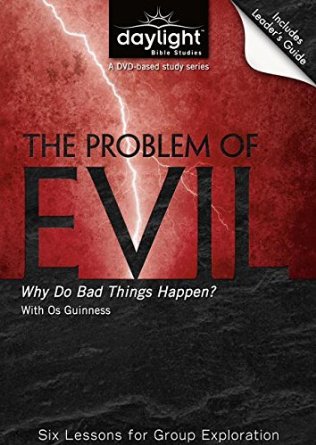 DVD The Problem of Evil: Why Do Bad Things Happen? Os
DVD The Problem of Evil: Why Do Bad Things Happen? Os
Guinness (Discovery House) $19.99 I have said here, as many, many have
before me, that Guinness is a brilliant communicator, a masterful
speaker and a wonderful preacher. Here is a chance to spend time with
him as he passionately and carefully tries to offer us tools for
understanding the nature of evil, respond to the intellectual demands
upon us when faced with great suffering, and learn how to offer
profound, Biblical answers to this nearly insurmountable human issue,
mysterious but essential for anyone wanting to live an examined life.
These six sessions are informal but nonetheless eloquent, inspired by his major paperback book Unspeakable: Facing Up to the Problem of Evil (HarperOne; $14.99) written after his speaking in New York on Wall Street right after 9-11. This offers mature insight, all kinds of thoughtful reflections, and is fabulous for personal learning and certainly great for small groups or classes.
 How (Not) To Be Secular: Reading Charles Taylor James K.A. Smith (Eerdmans) $16.00 I have reviewed at BookNotes this at great length when it first came out and continue to mention this from time to time (including above.) We were so impressed, we sponsored Smith to lecture on it two years ago at our annual Pittsburgh Summer Lecture, and although it is dense, Smith is always a lively writer; this an important, significant work for anyone wanting to get inside the head of those raised in these times. Seriously. Taylor, and Smith’s take on Taylor, compliment Guinness’s large sociological insights and overtly evangelical virtues.
How (Not) To Be Secular: Reading Charles Taylor James K.A. Smith (Eerdmans) $16.00 I have reviewed at BookNotes this at great length when it first came out and continue to mention this from time to time (including above.) We were so impressed, we sponsored Smith to lecture on it two years ago at our annual Pittsburgh Summer Lecture, and although it is dense, Smith is always a lively writer; this an important, significant work for anyone wanting to get inside the head of those raised in these times. Seriously. Taylor, and Smith’s take on Taylor, compliment Guinness’s large sociological insights and overtly evangelical virtues.
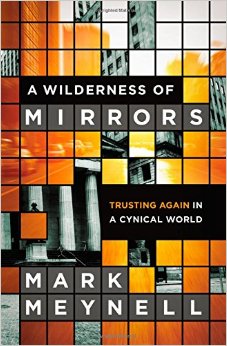 A Wilderness of Mirrors: Trusting Again in a Cynical World Mark Meynell (Zondervan) $18.99 This is an amazingly rich, thoughtful, interesting book by a young writer that deserves your attention. I’ve mentioned it before and it came to mind while reading Guinness. Here is how reviewer described it:
A Wilderness of Mirrors: Trusting Again in a Cynical World Mark Meynell (Zondervan) $18.99 This is an amazingly rich, thoughtful, interesting book by a young writer that deserves your attention. I’ve mentioned it before and it came to mind while reading Guinness. Here is how reviewer described it:
In A Wilderness of Mirrors Mark Meynell explores the roots of the discord and alienation that mark our society, but he also outlines a gospel-based reason for hope. An astute social observer with a pastor s spiritual sensitivity, Meynell grounds his antidote on four bedrocks of the Christian faith: human nature, Jesus, the church, and the story of God’s action in the world. Ultimately hopeful, A Wilderness of Mirrors calls Christians to rediscover the radical implications of Jesus s life and message for a disillusioned world, a world more than ever in need of his trustworthy goodness.
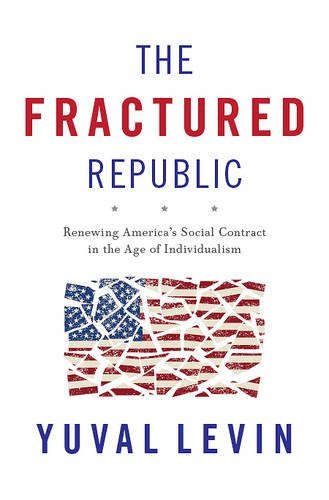 The Fractured Republic: Renewing America’s Social Contract in an Age of Individualism Yuval Levin (Basic Books) $27.50 I hope that you have seen this reviewed and cited on the internet or in significant journals — I cannot wait to read this yet this summer as it has been promoted across the political spectrum as substantive and thoughtful. Left-leaning Jonathan Haidt (The Righteous Mind) says “this is the book American most needs in 2016” and Paul Ryan says “Yuval Levin is one of the most insightful and original thinkers of our time.” Weaknesses? Strengths? Partisanship? We are dangerously fragmented in this “age of individualism” which is to say Guinness’s call to radically rethink our embeddedness in the ways of modernity are played out here. George Packer says of his humane and good writing that “His work gives the sense that our future needn’t be as grimly divided and dysfunctional as the present seems.” Don’t skip Guinness’s bigger picture for this, but this will make even that much more sense once you’ve gotten Guinness’s work in view.
The Fractured Republic: Renewing America’s Social Contract in an Age of Individualism Yuval Levin (Basic Books) $27.50 I hope that you have seen this reviewed and cited on the internet or in significant journals — I cannot wait to read this yet this summer as it has been promoted across the political spectrum as substantive and thoughtful. Left-leaning Jonathan Haidt (The Righteous Mind) says “this is the book American most needs in 2016” and Paul Ryan says “Yuval Levin is one of the most insightful and original thinkers of our time.” Weaknesses? Strengths? Partisanship? We are dangerously fragmented in this “age of individualism” which is to say Guinness’s call to radically rethink our embeddedness in the ways of modernity are played out here. George Packer says of his humane and good writing that “His work gives the sense that our future needn’t be as grimly divided and dysfunctional as the present seems.” Don’t skip Guinness’s bigger picture for this, but this will make even that much more sense once you’ve gotten Guinness’s work in view.
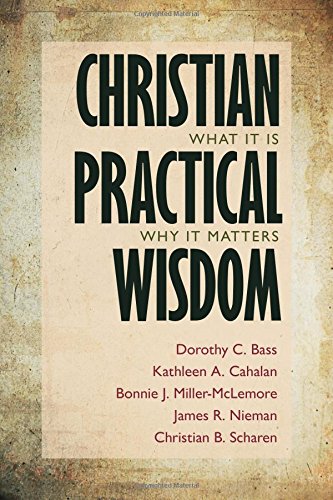 Christian Practical Wisdom: What It Is, Why It Matters Dorothy Bass et al (Eerdmans) $30.00 You may be surprised to see this listed here, but I think their semi-scholarly study of the role of wisdom in modern life will resonate with those interested in Guinness’s theme that our battle is not only against the ideas of modernism but the patterns of modernity. Here, they resist the abstraction of the modern world — the very way we’ve been taught to think about knowing — and restore insights about living wisely. Many of their grand, serious essays are about “the modern world” and how embodying daily practices discerning in light of spiritual truths from the Bible can offer restored and redemptive counter-voices to the way things are. As I’ve explained before, these pieces are written beautifully by astute theological educators from mainline circles and I think it is generative in inviting us to (as Mary Boys says of it) “ponder deeply and live with great intentionality…”
Christian Practical Wisdom: What It Is, Why It Matters Dorothy Bass et al (Eerdmans) $30.00 You may be surprised to see this listed here, but I think their semi-scholarly study of the role of wisdom in modern life will resonate with those interested in Guinness’s theme that our battle is not only against the ideas of modernism but the patterns of modernity. Here, they resist the abstraction of the modern world — the very way we’ve been taught to think about knowing — and restore insights about living wisely. Many of their grand, serious essays are about “the modern world” and how embodying daily practices discerning in light of spiritual truths from the Bible can offer restored and redemptive counter-voices to the way things are. As I’ve explained before, these pieces are written beautifully by astute theological educators from mainline circles and I think it is generative in inviting us to (as Mary Boys says of it) “ponder deeply and live with great intentionality…”
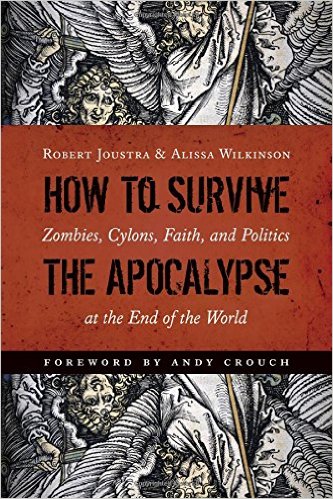 How to Survive the Apocalypse: Zombies, Cylons, Faith, and Politics at the End of the World Robert Joustra & Alissa Wilkinson (Eerdmans) $16.00 Okay, maybe you want to follow up Guinness’s nearly magisterial overview of secularization, the forces of modernity, and the call to live faithfully within but sometimes against the culture, discerningly and bravely. Want to follow Christ even in the details of life, like, say, your entertainment? Do you watch The Walking Dead or Game of Thrones or House of Cards? Did you like the Academy Award winning Her? As I have said before, these two brilliant young social critics offer half of their remarkable book as an introduction to Charles Taylor (and yes, they draw on James K.A. Smith.) The second half wonders how we can be impossible people, if you will — resolute as followers of King Jesus, people of grace and wisdom, caring about the common good — even as the culture is awash in apocalyptic pessimism and anti-heroes. As they say in the first paragraph: “The world is going to hell. Just turn on the television — no, not the news. Flip over to the prestige dramas and sci-fi epics and political dramas.” But why? And how then shall we live? Read Guinness, please. But read this, too. It is serious and seriously fun.
How to Survive the Apocalypse: Zombies, Cylons, Faith, and Politics at the End of the World Robert Joustra & Alissa Wilkinson (Eerdmans) $16.00 Okay, maybe you want to follow up Guinness’s nearly magisterial overview of secularization, the forces of modernity, and the call to live faithfully within but sometimes against the culture, discerningly and bravely. Want to follow Christ even in the details of life, like, say, your entertainment? Do you watch The Walking Dead or Game of Thrones or House of Cards? Did you like the Academy Award winning Her? As I have said before, these two brilliant young social critics offer half of their remarkable book as an introduction to Charles Taylor (and yes, they draw on James K.A. Smith.) The second half wonders how we can be impossible people, if you will — resolute as followers of King Jesus, people of grace and wisdom, caring about the common good — even as the culture is awash in apocalyptic pessimism and anti-heroes. As they say in the first paragraph: “The world is going to hell. Just turn on the television — no, not the news. Flip over to the prestige dramas and sci-fi epics and political dramas.” But why? And how then shall we live? Read Guinness, please. But read this, too. It is serious and seriously fun.
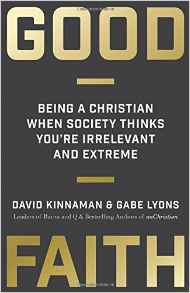 Good Faith: Being a Christian When Society Thinks You’re Irrelevant and Extreme David Kinnaman & Gabe Lyons (Baker Books) $19.99 I have announced this previously and mentioned it often. It seems perfect to list here, as a read for those who aren’t up to the big story stuff as Guinness walks us through the rise of modernity and the forces of liquid modernity as it is sometimes now called. His call to be uncompromising and diligent in our faithfulness is powerful and sophisticated but it is a bit heady. This quite readable book follows on similar tracks, inviting us to know the research (developed by the respected Barna Group) and consider how to respond to the increasing hostility about faith from the progressive secularist movement and others who, it seems, are more and more convinced that faith is just irrelevant, at best, and extremist dangerous, at worst. Guinness’s book is more profound — Gabe Lyon’s himself has a rave blurb on Impossible People — but this “cuts to the chase” as they say. It speaks (as human rights activist Christine Caine puts it) “prophetically to the church by diagnosing our condition and prescribing a course of powerful treatment.” Those with conventional Christian views or connections to churches are no longer part of the majority of the West. How we live out “good faith” in our generation will make a huge difference for the future of America. It is “an accessible guide” as one sharp reviewer put it. Again, agree or not with all their assumptions and conclusions, it is a very helpful, practical, useful resource to learn from and to talk about.
Good Faith: Being a Christian When Society Thinks You’re Irrelevant and Extreme David Kinnaman & Gabe Lyons (Baker Books) $19.99 I have announced this previously and mentioned it often. It seems perfect to list here, as a read for those who aren’t up to the big story stuff as Guinness walks us through the rise of modernity and the forces of liquid modernity as it is sometimes now called. His call to be uncompromising and diligent in our faithfulness is powerful and sophisticated but it is a bit heady. This quite readable book follows on similar tracks, inviting us to know the research (developed by the respected Barna Group) and consider how to respond to the increasing hostility about faith from the progressive secularist movement and others who, it seems, are more and more convinced that faith is just irrelevant, at best, and extremist dangerous, at worst. Guinness’s book is more profound — Gabe Lyon’s himself has a rave blurb on Impossible People — but this “cuts to the chase” as they say. It speaks (as human rights activist Christine Caine puts it) “prophetically to the church by diagnosing our condition and prescribing a course of powerful treatment.” Those with conventional Christian views or connections to churches are no longer part of the majority of the West. How we live out “good faith” in our generation will make a huge difference for the future of America. It is “an accessible guide” as one sharp reviewer put it. Again, agree or not with all their assumptions and conclusions, it is a very helpful, practical, useful resource to learn from and to talk about.
BookNotes
DISCOUNT
ANY ITEM MENTIONED
10% off
order here
takes you to the secure Hearts & Minds order form page
just tell us what you want
inquire here
if you have questions or need more information
just ask us what you want to know
Hearts & Minds 234 East Main Street Dallastown, PA 17313 717-246-3333
